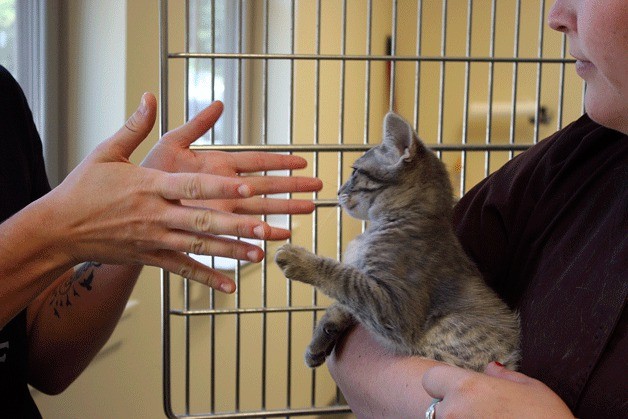“The more the merrier” is a philosophy the Whidbey Island Animal Improvement Foundation, or WAIF, tends to embrace when it comes to taking in cats and dogs.
But as another old saying goes, too much of a good thing is a bad thing, and this rings true when Shari Bibich considers the island’s significant feral and free-roaming cat population. The shelter manager of WAIF’s Coupeville facility, Bibich said the foundation has begun to readdress this issue with a new program, CATsNIP.
“There’s a huge feral and free-roaming cat population on the island,” Bibich said. “We have a very kind of up-and-go community and people don’t always think through having a pet.”
Though the shelter alters all animals they host at their adoption centers, WAIF has not offered a spay/neuter program for feral or free-roaming cats for over a decade.
But after moving into a larger facility just south of Coupeville last fall, the foundation introduced CATsNIP, a free Trap-Neuter-Return program aimed to help humanely reduce Whidbey’s feral and free-roaming cat population.
According to Bibich, feral cats are wild, meaning they have not been socialized with humans, whereas free-roaming cats are often outdoor pets left behind when their owners move. Usually both are unaltered, meaning they have not been spayed or neutered.
Having worked with the foundation since the 1990s, Bibich has seen how Whidbey is particularly susceptible to colonies of feral or free-roaming cats.
With a transient and often military-based population, Bibich says it’s not uncommon for cats to be left to live outside with the assumption that they will survive and have little impact on the rest of the community.
In truth, most humane societies and animal advocacy groups estimate that even one pair of these unaltered cats can produce about 420,000 offspring over a seven-year period.
This can cause a significant issue if left unchecked, which is why Bibich said WAIF wants to help reduce Whidbey’s population of cat colonies.
The program kicked off in March and allows community members to trap feral or free-roaming cats in their area and schedule them for the free procedure. The operations take place either the third or fourth Saturday of every month, and dates are already scheduled throughout the rest of the year.
Interested individuals only have to call WAIF’s Coupeville shelter and reserve a slot on their preferred date. If they don’t have the double-sided trap required by the veterinarians at the shelter, Bibich said they can rent one from WAIF with a $40 deposit that is refunded once the trap is returned.
“They can bring the cat in at 8:30 in the morning, unless otherwise instructed,” Bibich said. “The vets do the surgeries and then they can pick the cat up in the afternoon and release it.”
Every cat altered has the tip of its ear clipped to indicate that the procedure was done and will deter other roaming cats while unable to further increase the population.
“Their numbers will go down as we spay or neuter the cats and allow them to live out their cycle where we found them,” Bibich said.
“But if you don’t do anything, you’ve got a hot mess,” she said. “And we want to prevent a bigger issue rather than have to address something worse later.”
For more information on CATsNIP and WAIF’s other assistance programs, call the shelter at 360-678-8900 or visit WAIFanimals.org.
CATsNIP Dates
Saturday, July 23
Saturday, Aug. 27
Saturday, Sept. 24
Saturday, Oct. 22
Saturday, Nov. 19
Saturday, Dec. 17



